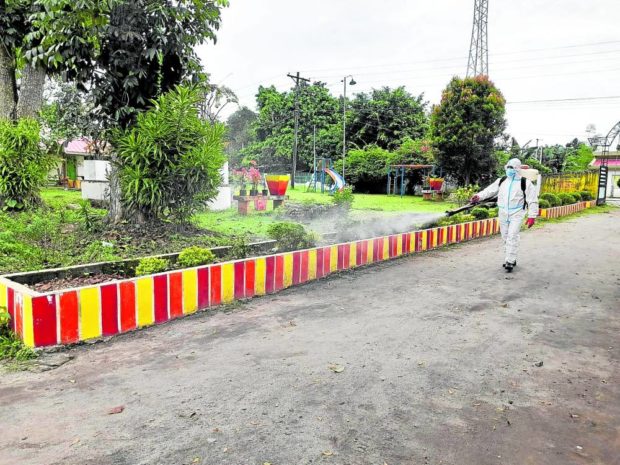HFMD cases in South Cotabato breach 300 mark

FIGHTING DISEASE The municipal disaster response unit of Banga, South Cotabato, starts disinfecting school compounds, classrooms and public areas in the town to protect residents, especially children, from the outbreak of the highly contagious hand, foot and mouth disease. —PHOTO COURTESY OF BANGA MDRRMO
KORONADAL CITY—Cases of the highly contagious hand, foot and mouth disease (HFMD) breached 300 in South Cotabato province, prompting residents in the most affected town of Banga to call for the declaration of state of calamity in their area.
Of the province’s 11 towns, Banga posted the highest number at 293 infections as the disease spread in 19 of the town’s 22 barangays, according to Dr. Ellen Quidilla, Banga municipal health officer.
Quidilla admitted the spread was rapid as the local health office recorded only 51 cases as of Jan. 30.
“This is already an outbreak,” she said. “In just six days, the number of infections in Banga rose to almost 300. We are doubling our efforts to contain it.”
Quidilla said the youngest patient was a 6-month-old baby in Barangay Poblacion while the oldest was a 76-year-old woman.
Article continues after this advertisementViral infection
Calls for the declaration of state of calamity in the town mounted as it would allow the local government to use its calamity fund for HFMD patients.
Article continues after this advertisementAccording to Dr. Rogelio Aturdido, South Cotabato provincial health officer, HFMD is a viral infection affecting soles, palms, mouth and skin, where blisters develop. It is highly contagious, especially among children.
He said the virus could be passed on through contacts with saliva, phlegm, human waste or the fluid inside the rashes of sick patients, usually through dirty hands and contaminated surfaces.
According to Quidilla, the disease is not life-threatening but the sores that develop in the mouth can prevent children from eating and might trigger other complications in people suffering from other health conditions.
Joseph Franco, head of the Banga disaster response office, said the municipal disaster risk reduction and management council was still studying whether to recommend the declaration of state of calamity to the local government.
“To date, we are still intensifying our disinfection activities in schools, especially in areas with high cases of HFMD,” Franco said.
—EDWIN O. FERNANDEZ INQ